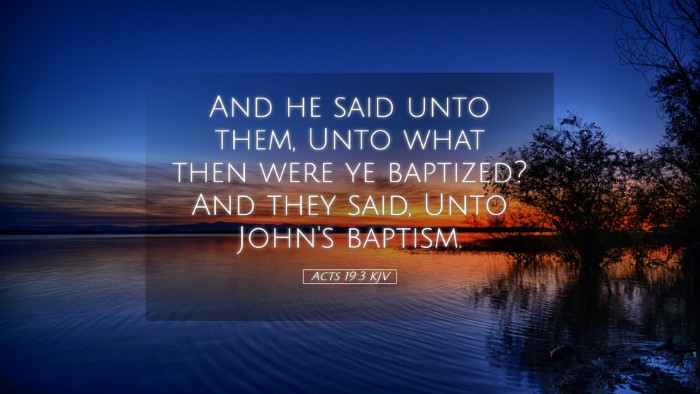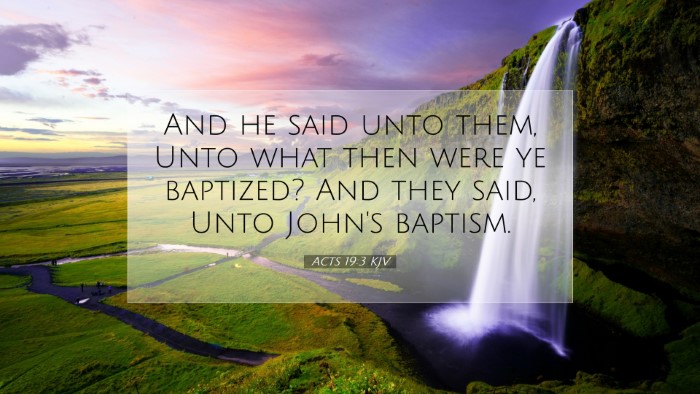Commentary on Acts 19:3
Verse Context: In Acts 19:3, we find the Apostle Paul engaged in a significant theological inquiry with the disciples he encounters in Ephesus. The verse states, "And he said unto them, Unto what then were ye baptized? And they said, Unto John's baptism." This moment invites a deeper exploration of baptism's role in the Christian faith and the transformative work of the Holy Spirit.
Historical Background
Understanding the backdrop of this passage is crucial. Ephesus was a major city in the Roman Empire, steeped in pagan practices and diverse religious beliefs. Paul’s interactions here signify a critical phase in the early church’s mission to integrate and transcend cultural religious identities with the Gospel of Jesus Christ.
Insights from Matthew Henry
Matthew Henry provides a profound reflection on the nature of baptism and its fundamental purpose in the life of a believer. He articulates that the importance of baptism lies in its public declaration of faith. In commenting on the phrase "Unto what then were ye baptized?" Henry posits that Paul seeks to draw a distinction between the baptism of John, which was one of repentance, and the baptism that is instituted in the name of Jesus for the remission of sins.
Henry further suggests that this interaction illustrates a lack of understanding among the disciples regarding the Holy Spirit, which Paul later addresses. This insight emphasizes the necessity for believers to have a clear understanding of the implications of their baptism beyond mere ritual.
Contributions from Albert Barnes
Albert Barnes enhances this discussion with a focus on the theological implications of baptism. He remarks on how the baptism of John was preparatory and pointed towards Christ. Barnes asserts that while John's baptism was valid in its context, it failed to represent the full revelation of the Gospel, particularly the indwelling of the Holy Spirit that follows Christ's ascension.
Furthermore, Barnes highlights the procedural aspects of baptism in the early church, conveying that the Ephesian disciples' experience served as a way for Paul to teach them about the expanded promise that accompanies the baptism of the Holy Spirit. This notion encourages readers to reflect on the transformative aspect of baptism as an empowering act rather than a mere traditional rite.
Insights from Adam Clarke
Adam Clarke delves into the significance of Paul's probing question, suggesting that it serves to illuminate the spiritual condition of the Ephesian disciples. Clarke notes that the query confronts them with the need to reconcile their understanding of repentance with the complete revelation of Christ’s work.
Clarke elaborates on the distinction made between the two baptisms, asserting that while the disciples acknowledged their baptism under John, they were unaware of Scripture's fulfillment in Christ. His commentary encourages pastors and theologians to challenge congregants to reassess their spiritual foundations and consider how their understanding of baptism affects their relationship with the Holy Spirit.
Theological Implications
The dialogue found within Acts 19:3 serves as a powerful reminder of theological education in the Christian faith. The inquiry posed by Paul requires a deeper exploration of one's faith journey and encourages an authentic connection to the transformative power of the Holy Spirit, which is often underrepresented in modern discussions around baptism.
Furthermore, this passage illustrates the necessity of understanding the totality of baptism—encompassing not only the act of immersion but also the conviction of repentance and the empowerment through the Spirit. It challenges both congregational leaders and believers to engage in discipleship that recognizes the fullness of God's revelation.
Practical Application for the Church
- Disciple Making: This passage serves as a guide for creating a robust discipleship process that emphasizes understanding the fullness of the Gospel, including the role of the Holy Spirit.
- Engaging Conversations: Pastors and leaders should foster environments where theological discussions can flourish, inviting members to explore the depths of their faith beyond traditional practices.
- Spiritual Empowerment: The church must actively teach about the gifts and fruits of the Spirit that accompany true baptism in Christ, reinforcing the idea that the Holy Spirit empowers believers for ministry.
Conclusion
Acts 19:3 provides an essential narrative that navigates the complexities of baptism and the Christian experience of receiving the Holy Spirit. By synthesizing the insights from luminaries like Matthew Henry, Albert Barnes, and Adam Clarke, we gain a more profound understanding of the significance of baptism as a covenantal sign and its implications for the church today. The passage calls believers to pursue a deeper faith that actively engages with the dynamic nature of God’s Spirit, inviting them into a fuller experience of life in Christ.


